A Traveller’s Journey of Justice and Identity
Yesterday I preached this sermon at St. Paul’s United and Grace United churches in Brampton, ON. My first time preaching about my 18 month adventure! Hope you like it.
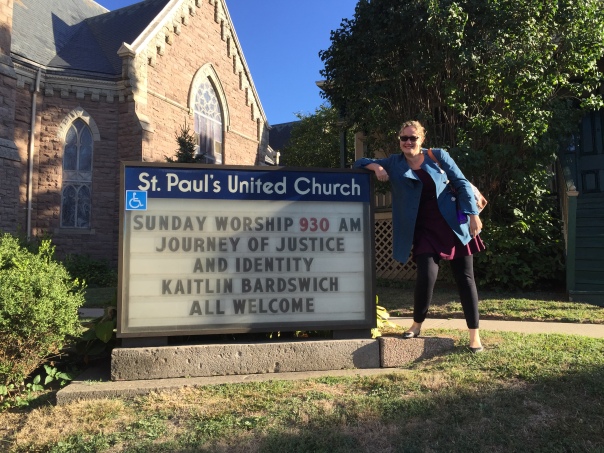
Good morning. My name is Kaitlin Bardswich and I’m a member of the United Church of Canada. I worked for the national office for 3 years before spending the last 18 months travelling and doing freelance journalism, including interviewing United Church partners around the world. I’d like to begin by painting a scene for you.
It’s early afternoon in Gaza City on December 3 of last year.
I’m accompanied by two Muslim employees of a Christian NGO working in the Strip, the Near East Council of Churches.
Sitting in the back of a white van as it cruises through the narrow streets, a bullet hole in the windshield a stark reminder of the last war, I’m desperately trying to get my cell phone to connect to an Israeli service provider so that I can set my blog to “private” and not risk outing myself as a lesbian while I’m there.
It’s been an interesting day and I only crossed the border a few hours earlier.
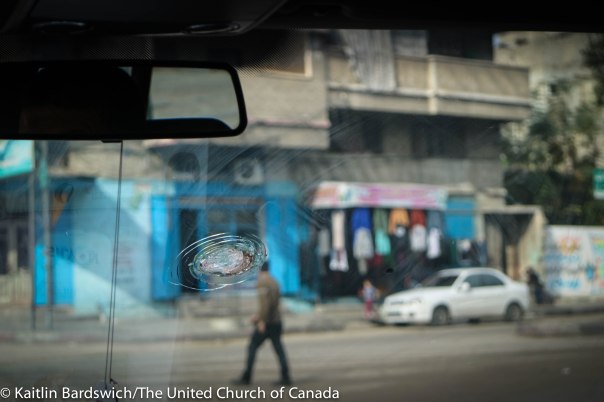
This journey into Gaza was one of many incredible experiences I’ve had over the last couple of years. I’ve recently returned from a year and a half of travelling the world, starting in Pakistan and ending in Colombia, taking in parts of South Asia, Europe, North Africa, the Middle East, and Latin America along the way.
It was a personal journey as well as a professional one, as I worked as a freelance writer, photographer, and videographer along the way, documenting stories of human rights and social justice.
While I interviewed human rights activists working for peace, gender equality, indigenous rights, and food security, among others, my theme across every country was LGBTQ rights. I interviewed lesbian, gay, bisexual, trans, and queer people around the world, as well as their straight allies. It was a privilege to get a glimpse into the lives of these people who face real struggles that I can only imagine.
I’d like you to take out your bulletins and take a look at the cover photo. That man is Xulhaz Mannon, an LGBT activist in Bangladesh. I interviewed him in May last year in Dhaka, the capital of Bangladesh, along with two other activists.
We met in his apartment, where he lived with his parents. Sitting cross-legged on the floor of his bedroom, he served us tea and cookies as his cat walked from lap to lap.
We spoke about the ongoing persecution the LGBT community faced in Bangladesh, as well as the ongoing killing of secular bloggers. At the time, there was a rumour that there was a list of gay rights activists to be killed circulating in extremist circles.
“I asked if my name was there,” Xulhaz told me with a laugh. “If there is a list, I wouldn’t be surprised.”
And now to refer to the quote in your bulletin. He then said, “These people, I always say, if they came to me and talked to me I would have a chance to explain, this is why I do this. But they will not do that. They will just come and kill you.”
Unfortunately, Xulhaz was right.
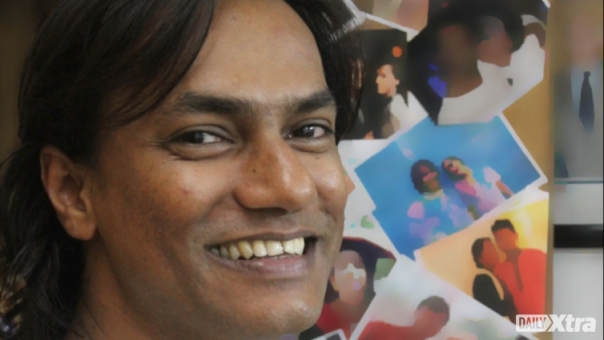
Less than a year later, on April 25, 2016, Xulhaz and fellow LGBT activist Mahbub Tonoy were killed in that same apartment — hacked to death by at least five machete-wielding intruders.
Ansar al-Islam, a Bangladeshi affiliate of al-Qaeda, later claimed responsibility.
In the aftermath of the attacks, the LGBT community in the country quickly went underground.
I’ve interviewed dozens of LGBT people in my travels, across the continents. After awhile, the stories they told became unsurprising in their similarity.
They talked about growing up and thinking they were the only gay person in the world, about hiding their sexuality from their families, and about getting kicked out of their home when they did come out. They’ve had to worry about things like blackmail, sexual assault, police harassment, mob violence, jail time, and even death.
Why is this? One of the reasons I chose to focus on LGBT rights throughout my 18 month long adventure was because this facet of a person’s identity is the one thing that unites the world in hatred and discrimination.
I’m going to go out on a limb and say that you can find at least one person in every nation on Earth with a prejudice against LGBT people, ranging from believing we don’t have the same rights as straight people when it comes to marriage, to believing that we don’t deserve to live.
Yet, as the readings today tell us, we are all fearfully and wonderfully made. God made us just as we are – there is nothing wrong with any part of our identity.
As the Lord says to Jeremiah – “Before I formed you in the womb I knew you,
before you were born I set you apart;
I appointed you as a prophet to the nations.”
We are all appointed to be prophetic. We are all called to seek justice and love mercy.
God does not differentiate between his children. As Paul writes, there is neither Jew not Gentile, neither slave nor free, nor male and female. No one is better than another; no one worse. We are all one, with equal rights.
Following that logic, there is neither straight nor gay. Neither trans nor cis gender.
(I’d just like to make an aside note that the passages about God creating us in His image, or being fearfully and wonderfully made, should not be misconstrued as being anti-trans. Some people use these passages to say that if we are made the way God intended, we should not change our bodies. But if we took these passages literally, rather than figuratively as I believe they are intended, than anyone here who has their ears pierced or hair highlighted, been tattooed, or has ever taken an Advil let alone had surgery would also not pass that litmus test.)
I see Jesus as a radical rebel of his time. He didn’t accept the status quo, or what religious and political leaders decreed as right. He ate and drank with those with identities that were considered sub-human. The prostitutes and the tax collectors. Probably the LGBTQ community as well, since we existed then as we did before then and as we do now.
This concept of identity was one that I really struggled with while I was travelling. It was the first time in my life that I felt the need to hide any aspect of my identity. While I came out a bit later in life, in my mid-20s, I’ve never felt the need to be closeted.
But when I was travelling in certain countries, “playing it straight” was a smart if not protective move. Some of these countries had laws making homosexual acts illegal, while in others it was still a taboo and dangerous topic.
As an example, when I was in Jordan, a country that does not outlaw homosexuality, I mentioned to someone who was fairly progressive that I was working on LGBT rights.
“Don’t talk about that here. People get killed for that,” he warned me.
I’ve had some people tell me that this shouldn’t bother me, needing to be closeted, that my sexuality does not define me, and that I don’t have to go around proclaiming that I’m gay.
But the funny thing is, it’s usually straight people who tell me that. And they don’t always realize that, while it’s true I don’t need to proclaim my sexuality wherever I go, when I’m travelling in homophobic countries – where the punishment of being who I am is jail, harassment, or even death – it’s still horrible to have to constantly deny a part of who I am.
What if it was something else? What if I was Jewish and everywhere I went people assumed I was Christian? Or what if I was mixed race but had such pale skin that everybody assumed I was White? It’s not just about sexual orientation or gender identity – having to hide any aspect of your identity because of fear, frankly, sucks.
No one wants to be invisible – we want to be seen for who we truly are.
For me, those constant reminders of hiding a part of who I am were the times when fellow female travellers want to bond over the cuteness of a nearby man, and I don’t know if it’s wise to say that actually I’m not attracted to him or to any man. Or having to constantly invent a husband in some countries to make men stop following me and talking to me. Or the fact that it’s really, really difficult to have any holiday romances for fear of outing myself to an unaccepting person.
Or even just the simple knowledge that a lot of the people I’m meeting, who are kind to me or invite me in for tea or give me directions, would probably feel very differently about me should they know this one piece of information about who I am.
It’s also the times when I get tired of pretending or denying a part of my identity, and I do come out, in places where I feel safe to do so, and then having to deal with a nosy Argentinean taxi driver, for example, who says it doesn’t matter to him, that love is love, but wouldn’t I still want to sleep with him? Just him? Because I’m really his type, with the blonde hair and everything.
That can all be really difficult to live with, day to day, if you think about it too much.
But of course, that’s nothing compared to what the local LGBT communities live with.
Sometimes I wonder if most of the tourists who visit some of the places I went ever think about any of these things. When walking through the Jardin Majorelle in Marrakech, which according to Tripadvisor is the #1 thing to do in that city, do they think about the fact that it was created by a couple who were criminals here for loving each other? (That couple would be Yves St. Laurent and Pierre Bergé).
When they go to see the famous Hassan Tower in Rabat, do they know that two Moroccan men were arrested there last June for standing too close together while posing for a photo? They were a gay couple and were each sentenced to four months in prison. They were still imprisoned when I took this photo.
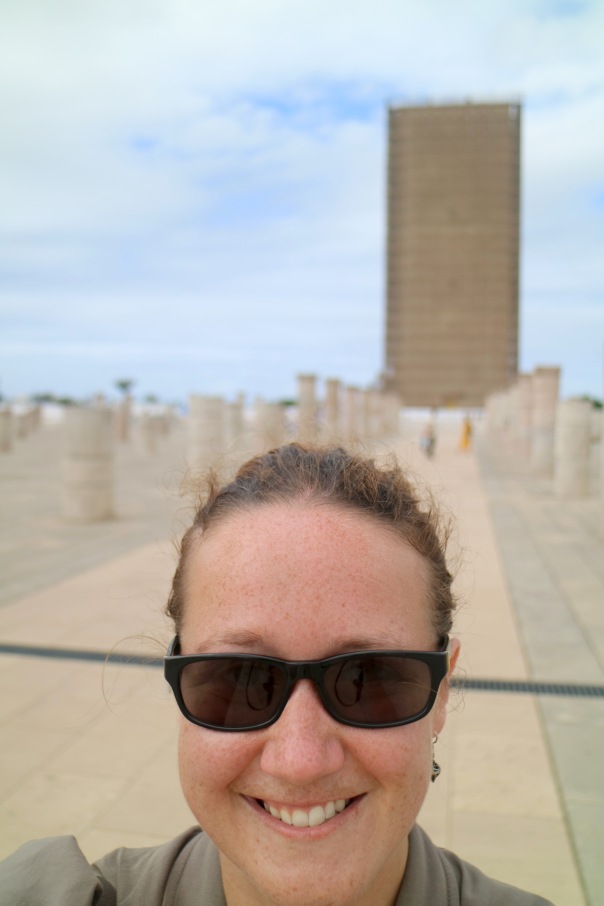
I was in rural Colombia when the massacre at The Pulse nightclub in Orlando occurred, which was only the latest in a long history of fatal violence in LGBT clubs in North America, I would learn. And being in the small village where I was, I felt completely alone – not able to tell anyone why I was so upset if anyone asked.
It’s been an interesting journey. While I love being able to experience so many new cultures and meet many interesting people, there are times when I reach a point of feeling completely and emotionally exhausted with having to pretend I’m straight.
It’s not the pretending to be straight specifically that is tiring, but the pretending to be something that I’m not. And knowing that if I didn’t do that, my experiences would likely be much different.
Being so exhausted by this near constant pretending has made me realize two very important things: I have immense privilege in that I can (1) pass as straight and (2) that I usually don’t have to.
Last August in Cork, Ireland, I got my first tattoo. I have the gaelic word samhlaigh, which means “imagine,” tattooed on my foot. It’s mainly for my grandmother, who would exclaim “Imagine!” whenever she heard something interesting or exciting. But it’s also partly to celebrate the fact that I can now legally get married in both countries where I hold citizenship – Ireland and Canada (Imagine!).
And perhaps, subconsciously, this declaration tattooed onto my often exposed skin is my way of claiming my entire identity, no matter where I travel.
I only wish it didn’t have to be so cryptic, for me or for anyone.
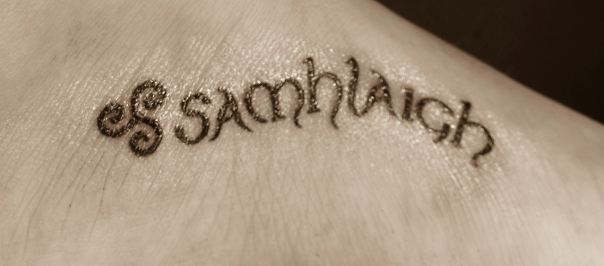
At the end, I mentioned some of these points about being an LGBTQ ally:
1.Don’t make assumptions. Instead of “Do you have a boyfriend?” ask “So are you seeing anyone?”
2.Ask what gender pronoun or gender neutral pronoun someone would like to be referred to as. (she/he/they)
3.Talk positively about LGBT people, especially around young people. Let them know that they can talk to you if they ever need to.
4.Tell your kids you’ll love them no matter who they love.
5.Consider donating to an international LGBT charity or rights organization.
6.Attend a PRIDE parade or another LGBT event to show your support.
7.Don’t judge us; just love us.
8.Acknowledge that we didn’t choose to be LGBT, but we are choosing to be happy.
*Parts of this sermon originally appeared in an article for Verge Magazine
Posted on September 26, 2016, in LGBTQ. Bookmark the permalink. Leave a comment.
Leave a comment
Comments 0